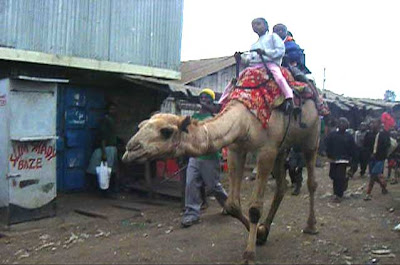[youtube http://www.youtube.com/watch?v=rkSwrGHorfY&w=425&h=349; float=”left”]
A few days ago, in the late afternoon, two men stopped a taxi driver at a junction in Soweto East, Kibera. They were thieves running from a crime and needed a getaway ride to Kirangari. The driver refused so the men asked him to just take them to Ndugu stage, a much closer destination, instead. He agreed, but by then the thieves had changed their mind. The taxi driver was shot in the head.
As you can see from the video, I often pass through Soweto East on my way to work. I haven’t seen the story covered in any of the local papers, but I know the junction where the murder took place very well. It’s just a short distance from the school where we’ve been fixing water tanks and the church where we’ve been giving hygiene trainings. From word of mouth, I’ve learned that the crime scene happened at the point where the tarmac on the road turns to dirt. Cars often get stuck there trying to get over an exposed drainage pipe. The incident is typical of the stories of violence I’ve heard about Kibera. Journalist and residents alike weave this element into their narratives of drugs, rape, and filth that make up this slum tragedy.
Yet, this is not my first or even second impression of Kibera. What I see when I walk through the narrow passageways of Kibera are streets bustling with industy. Market stalls are stocked with every imaginable good, from produce to electronics; wheelbarrows are weighed down with anything from bags of cement to three dozen pineapples; the wash is hung out on lines that span the street; metalworkers weld door frames; bags of feed are hauled to small-scale chicken farms; and nyama choma sizzles upon charcoal stoves along the roadside. Kibera is one giant informal market. Everyone is trying to make a buck and the scale of entrepreneurship here is staggering. Before they end up crushing Sub-Saharan Africa with their policies, the Washington Consensus might benefit from learning a few lessons about the free market from a place where it is a fact of life.
It’s clear that poverty has crippled Kibera, but it doesn’t exactly induce the pity-inducing cry for help that NGOs, church missions, and charity groups would have you believe. Yes it has some devastating problems, but some semblance of normal life takes place here. Last week I was at a friend’s house tucked away in a back alley listening to Kenny Rodgers when the screams of children cut through the music. We rushed out to the corner to see what all the commotion was about. A mob of kids cheered as a man led a camel through the street. Three small riders perched on the beast’s hump bobbed up and down. I immediately got excited. I looked over to my friend and admitted to him that the sight was amazing. He shot back a blasé look.
“C’mon now, really? This type of thing happens every week.”
[youtube http://www.youtube.com/watch?v=jZqZ3PgFZHI&w=425&h=349]





Good work JP. I like.